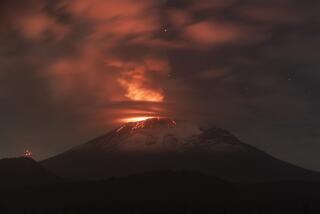Volcano Cited for Cooler World Climate
- Share via
WASHINGTON — Dust and chemicals from last year’s eruption of Mt. Pinatubo have cooled the Earth significantly by blocking incoming sunlight, a government scientist reported Monday.
The planet’s average temperature dipped about 1 degree Fahrenheit between the eruption on June 16, 1991, and May of this year, the report from the National Oceanic and Atmospheric Administration said.
“It is a tremendous amount of cooling,” said Ellsworth Dutton of NOAA’s Climate Monitoring and Diagnostics Laboratory in Boulder, Colo.
Scientists said the cooling trend is temporary; it should be over in five years. But even a short-lived temperature drop will make it more difficult for scientists to determine if the so-called greenhouse effect is actually warming the Earth.
The greenhouse effect is caused by industrial gases that allow sunlight to pass through but trap the resulting heat around the planet. The volcanic cloud blocks some of the incoming sunlight, which means there is less heat to be trapped by the greenhouse effect.
Dutton said a layer of sulfuric acid droplets released by the Philippine volcano has caused a decrease in the total amount of solar energy reaching the Earth’s surface.
He reported that, although some areas have been warmer than others, most of the globe has cooled.
The Northern Hemisphere, where the volcano is located, has cooled about 1.5 degrees, he said. Dutton said Monday that his temperature calculations were based on measurements made by microwave sensors aboard NOAA satellites.
The layer of acid now covers the globe in the lower stratosphere, about 12 to 14 miles above the surface. The layer has been measured by laser-radar instruments in Alaska, Hawaii, American Samoa and Antarctica, officials reported.
The acid was created by sulfur dioxide from the volcano. NOAA said it poses no threat to life and is expected to fall out of the atmosphere gradually over the next two to three years. Any cooling induced by the volcano should disappear completely within five years, officials said.
National Aeronautics and Space Administration researchers reported two weeks ago that the dust from Mt. Pinatubo had spread worldwide and said effects on weather were likely.






